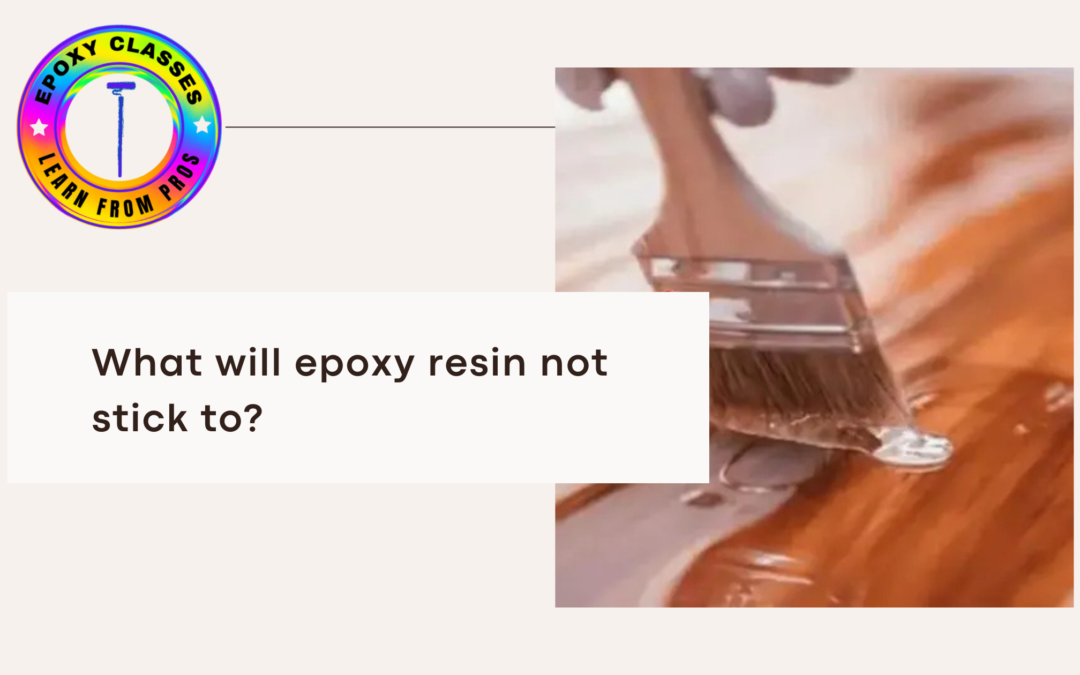Discover What Will Epoxy Resin Not Stick To?
Epoxy resin is popular among DIYers and professionals for its strength, durability, and beauty. It’s used in crafting, construction, and industry. However, success depends on knowing which surfaces don’t stick to epoxy.
This knowledge prevents costly mistakes, saves time, and increases creativity. Understanding epoxy’s limits allows craftsmen to innovate, leading to stunning project results.
We will explore materials that epoxy resin struggles to stick to. We will provide insights into its behavior with various surfaces. Finally, we will offer tips for better resin use.
What Does Resin Not Stick To?
Epoxy resin won’t stick to some materials. They have slick, non-porous surfaces or chemical properties. These materials are often used as barriers in resin projects. They ensure easy removal and clean workspaces.
Common Materials That Resist Resin
- Plastic Wrap: Does resin stick to plastic wrap? No. Plastic wrap’s smooth, flexible surface repels epoxy resin. So, it is a popular choice for protecting surfaces during resin projects.
- Silicone Molds: Resin and silicone create magic together. This combination boosts creativity. They don’t stick, ensuring easy releases. Silicone molds make removal simple, and perfect for jewelry, coasters, and complex designs.
- Parchment Paper: Does epoxy stick to parchment paper? No. The waxy coating on parchment paper prevents sticking. It’s commonly used to line work surfaces.
- Wax Paper: Similar to parchment paper, does epoxy stick to wax paper? No, it doesn’t. Wax paper is great for protecting surfaces when working with resin.
- Teflon-Coated Surfaces: Teflon surfaces are non-stick and repel resin. So, they’re perfect for reusable molds and barriers in resin projects.
Does Epoxy Resin Stick to Plastic?
This question often arises, as plastic is popular in crafting and construction. Does epoxy resin stick to plastic? It depends.
- Plastics That Resist Adhesion: Some plastics, like polyethylene and polypropylene, resist epoxy resin. Their smooth, non-porous surfaces are to blame.
- Improving Adhesion: For tricky plastics, sanding or using epoxy adhesives improves bonding. These methods enhance adhesion on difficult materials.
Epoxy Mold Considerations
Silicone is the best material for resin molds. Its flexibility and non-stick properties make it popular among crafters. Detailed designs come out perfectly, and cured resin pops out easily. For beginners in resin art, silicone molds are the ideal choice.
Tips for Epoxy Molds
- Always use mould release for epoxy resin to ensure smooth demolding.
- For creative projects, try unique resin mold ideas. Make custom keychains, artistic coasters, or decorative trays.
What Will Resin Do to Aluminum?
Epoxy resin bonds exceptionally well to metals like aluminum when prepped correctly. Sanding the aluminum surface increases adhesion. But applying mold release ensures the resin doesn’t bond permanently if that’s not desired.
Use aluminum as a mold surface for flat resin projects. It is durable and gives smooth results.
Does Resin Stick to Glass?
Does resin stick to glass? Yes. Epoxy resin bonds to glass provided the surface is clean, dry, and free from oils or residues. This enables creative uses, like embedding designs in glass tables or making decorative glass art.
Fiberglass Resin vs. Epoxy Resin
When comparing fiberglass resin vs epoxy resin, it’s important to understand their distinct properties:
- Fiberglass Resin: It’s cheap and used in big projects, like boat repairs. However, it’s less lasting than epoxy resin. Available in bulk sizes like fiberglass resin 5-gallon containers.
- Epoxy Resin: Epoxy resin is strong, durable, and clear. It is the best choice for high-quality crafts and repairs.
Helpful Tips for Resin Projects
- Use Mold Release: Always use mold release for epoxy resin. It will protect your molds and make demolding easier.
- Experiment with Resin Mold Ideas: You can make custom jewelry or coasters. The possibilities are endless.
- Learn Resin Techniques: Consider classes like Epoxy Classes NY. They can teach you advanced resin techniques and product compatibility.
- Protect Work Surfaces: Use parchment paper, wax paper, or plastic wrap to stop resin from bonding to unintended surfaces.
Safety Resin Use
Understanding safety protocols and material compatibility is crucial when working with epoxy resin. The OSHA has useful information on handling chemicals, like resins. It includes safety guidelines, protective measures, and hazards. These resources can help you stay safe while achieving your resin project goals.
Conclusion
It’s crucial to know what epoxy resin sticks to. It is also important to know what it doesn’t stick to. This knowledge is key to successful resin projects. Proper prep and surface selection are key. This is true for resin and silicone molds, and for glass, aluminum, or plastic. They make all the difference.
Workshops like Epoxy Classes NY teach resin techniques. They suit both beginners and experienced crafters. They offer hands-on learning. Use mould release for epoxy resin. Explore new resin mold ideas to boost your creativity.
With the right knowledge, you can make stunning, pro-grade resin projects. You will avoid common pitfalls.
FAQs
What does resin not stick to?
Epoxy resin easily slides off plastic wrap and silicone molds. Parchment and wax papers offer no grip. Teflon-coated surfaces are too slippery. These materials are smooth, non-porous, and repel epoxy.
Does epoxy resin stick to plastic?
It depends. Epoxy resin struggles to bond with plastics like polyethylene and polypropylene. Sanding the surface or using adhesives like sticks putty epoxy can help.
How do you make a resin mold?
Use flexible silicone to make resin molds. These molds are non-stick, making it easy to remove your creations. You won’t have to worry about chips or cracks. Your finished resin pieces come out smoothly!
Does epoxy stick to wax paper?
No, epoxy resin doesn’t stick to wax paper. The waxy surface prevents adhesion. It’s ideal for lining workspaces in resin projects.
Does resin stick to glass?
Yes, resin can stick to the glass as long as the surface is clean, dry, and free from oil or dust.
